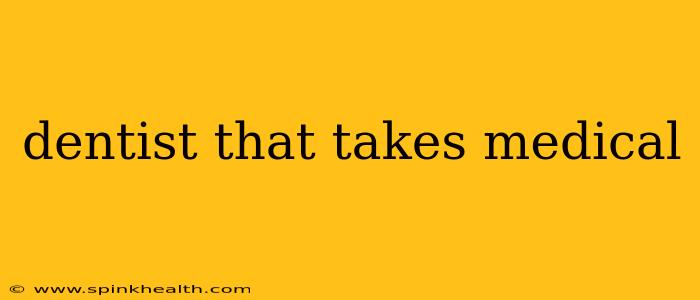Finding the right dentist is crucial for maintaining good oral health. But what happens when you need dental care and your insurance is a medical plan, not a dental one? Navigating this can feel like a maze, but don't worry! This guide will help you find a dentist who accepts your medical insurance and answers some common questions along the way.
Let's start with a story. Imagine Sarah, a young professional with a comprehensive medical insurance plan. She chipped a tooth during a clumsy yoga session. A trip to the dentist was inevitable, but Sarah was surprised to learn that her plan didn't cover typical dental procedures. She felt lost and frustrated. This is a common experience, and it shouldn't be!
How Can I Find a Dentist Who Takes My Medical Insurance?
This is the most important question, and the answer involves a multi-pronged approach. Firstly, contact your insurance provider directly. They have a provider directory that lists dentists who participate in their network and accept medical insurance for specific dental procedures. This is often the most efficient starting point. Their customer service line can also guide you and answer any questions you may have about coverage.
Secondly, you can use online search engines. When searching, be specific. Instead of just "dentist near me," try phrases like "dentist that accepts [your insurance provider] medical insurance" or "dentist that treats medically necessary dental procedures." Refining your search this way increases the likelihood of finding relevant results.
Finally, consider contacting local dentists directly. Explain your situation; many dentists are willing to work with patients who have medical insurance plans, particularly if the dental issue is linked to a medical condition. Remember, be upfront about your insurance coverage from the beginning to avoid unnecessary surprises.
What Dental Procedures Are Typically Covered by Medical Insurance?
This depends entirely on your specific insurance plan, so reviewing your policy documents is crucial. However, medical insurance often covers dental procedures deemed medically necessary. These might include:
- Extractions related to a medical condition: For example, if an infected tooth needs to be removed to prevent a systemic infection.
- Treatment of oral injuries: Injuries resulting from accidents or trauma are frequently covered.
- Treatment related to certain medical conditions: Conditions like uncontrolled diabetes or severe gum disease (periodontitis) can sometimes necessitate dental procedures covered by medical insurance.
- Dental procedures for pregnant women: Specific dental care might be covered during pregnancy to safeguard both the mother and baby's health.
It's important to remember that routine cleanings and cosmetic procedures are usually NOT covered by medical insurance. These are considered elective procedures, whereas the examples above are often considered medically necessary.
Does My Medical Insurance Cover Dentures?
This is a common question. In most cases, medical insurance is unlikely to cover full or partial dentures as a routine procedure. Dentures are generally considered a restorative procedure rather than a medically necessary one, unless there is a specific underlying medical reason. However, the extraction of teeth that need to be removed to prepare for dentures might be covered. Always check with your insurance provider to understand what exactly your plan will cover.
What if My Dentist Doesn't Accept My Medical Insurance?
Don't despair! While frustrating, it's not uncommon. You could explore a few options:
- Seek out another dentist: Use the methods mentioned above to find another dentist who accepts your medical insurance.
- Negotiate a payment plan: Some dentists may be willing to work with you to create a manageable payment plan.
- Explore options for financial assistance: There may be local or national programs offering assistance for dental care.
Finding a dentist who accepts your medical insurance can take some legwork, but armed with the right information and strategies, the process becomes significantly easier. Remember, consistent oral health care is vital, and with a bit of persistence, you can find the care you need.

